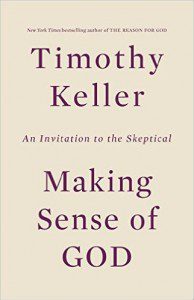 Are there any moral obligations on us as humans?
Are there any moral obligations on us as humans?
Is terrorism wrong?
Is incest wrong?
How old is the age of consent? (Is this concept meaningful?)
Are children (or wives) property?
Is gender equality always good?
Is racism always wrong?
Is infanticide wrong?
Why shouldn’t the powerful man demand sexual satisfaction?
The list could go on. The answer to each of these questions requires some kind of moral judgment or standard. Everyone has a context and standard for their judgment. Tim Keller digs into “the problem of morals” in the next chapter of his book Making Sense of God.
First, it is important to make a point that Keller generally makes when discussing this topic. Moral behavior (in the context of a culture) is not confined to religious or irreligious people. Atheism does not lead to moral bankruptcy or religious conviction to moral stability. “Anyone who tries to claim that atheists are either individually or as a whole less moral than others will run up against common sense and experience.” (p. 177) The key question isn’t “what makes people moral?” but “what is the foundation for our moral judgments?” Any argument that atheism leads to evil or religion leads to good (or vice versa) will run into some real historical complications. To begin with, both atheism and theism have been used to justify horrendous (in my judgment) evil.
The question that Keller addresses (and one that he has found central to many discussions with skeptics) centers on our foundation for moral judgments. Do we have a moral duty to some absolute definition of right and wrong, good and evil? Is there any reason to view morality as anything more than a (temporary) culturally defined set of functional values? Our modern Western society places a significant value on the worth of every human life. If this defines morality, “it could be claimed that secular Western society is one of the most moral cultures in history.” (p. 179) Keller suggests that many people have an intrinsic certainty that this kind of humanism is simply “right,” but no foundation for this certainty, no rational reason.
In accord with secular materialism, two reasons are commonly advanced for our moral convictions.
Evolution. Our moral convictions could be the result of natural selection enhancing the survival probability for our species. This has led to a number of discussions as to how altruism and concern for others (not only family, tribe, or race) could enhance survival probabilities. Although some (like one of the authors quoted by Keller) dismiss the evolution argument on this ground, I believe that this is premature. We really don’t understand the process well enough to completely determine why a specific complex social behavior such as altruism enhances or diminishes survivability. These questions are an active focus of research across a number of different disciplines.
 However, even if our moral convictions are the result of evolutionary pressure, this doesn’t make them objectively right or wrong. At best they were useful. Note, I didn’t say “are” useful. They brought us to the present, but they may be a hindrance rather than an asset moving forward. Keller makes this point – “Does the fact that this behavior was practical in the past constitute a moral obligation (not just a feeling) that we must do it now? Of course not.” (p. 182) We can also point to behaviors found in other species, especially other primates. Geladas, for example, (see here, image source) live in units with a single dominant male. When a new male takes over all the infants are killed and the majority of pregnant females abort within weeks. Perhaps such strategies would enhance the survival of future human populations. Who is to say?
However, even if our moral convictions are the result of evolutionary pressure, this doesn’t make them objectively right or wrong. At best they were useful. Note, I didn’t say “are” useful. They brought us to the present, but they may be a hindrance rather than an asset moving forward. Keller makes this point – “Does the fact that this behavior was practical in the past constitute a moral obligation (not just a feeling) that we must do it now? Of course not.” (p. 182) We can also point to behaviors found in other species, especially other primates. Geladas, for example, (see here, image source) live in units with a single dominant male. When a new male takes over all the infants are killed and the majority of pregnant females abort within weeks. Perhaps such strategies would enhance the survival of future human populations. Who is to say?
Social Constructionism. Moral values arise and are ingrained in a social community. We hold to certain values because our society has educated us in this value system. Values survive and evolve because they “work” in one form or another. But this, like biological evolution, doesn’t lead to moral absolutes or moral obligations. Our moral convictions are culturally relative. There is no ground to judge one system as superior to another. The role of women in Saudi Arabian and American society are both valid functional cultural systems.
Nonetheless, moral conviction remains strong. Keller alludes to an example from Philip Gorski of “academic social scientists, thoroughgoing relativists in their theory who nonetheless get moralistic and furious over “data fudging” by other scientists. … they insist that other people’s values are socially constructed but then they unavoidably act as if their own values are not.” (p. 183)
Purpose. Later in the chapter Keller introduces another idea. Moral obligation can only arise when there is a purpose or end toward which we are moving. The denial of purpose in secular Western society leads to an denial of moral obligation or absolutes. This brings me back to the example above. Scientists (including social scientists) become “moralistic and furious over “data fudging” by other scientists” because there is a purpose to the discipline – an end goal. The goal is to uncover truth about the world and data fudging undermines and sidetracks this purpose. It is intrinsically wrong because it defeats the agreed upon purpose. While the purpose of an object (like a watch or a house) can be defined in a straightforward manner, and the purpose of an academic discipline or pursuit can likewise be defined, many secular Western society will deny that humans have any identifiable purpose or goal. This causes the problem.
All judgments that something or someone is good or bad do so based on an awareness of purpose. If you know what that purpose is, then your moral evaluation of something can be a factual statement, a truth that exists apart from your personal likes and dislikes. … If, however, you have no idea of the purpose of an object, then any description of it as “good” or “bad” is wholly subjective, completely based on inner preferences.
How, then, can we tell if a human being is good or bad? Only if we know our purpose, what human life is for. If you don’t know the answer to that, then you can never determine “good” or “bad” human behavior. If, as in the secular view, we have not been made for a purpose, then it is futile to even try to talk about moral good and evil. (p. 186-187)
Responsibility. Responsibility can provide a purpose that leads to moral obligation. A responsibility to care for the earth, to care for each other, to care for future generations, all of these lead to moral obligation. Responsibility implies relationship – we are responsible to others (including animal life), but not to objects. Keller suggests that this idea of responsibility can lead us to God, responding to a skeptic “I’d like you to consider that your moral intuition is sensing a relationship and responsibility to your Maker.”
The moral argument for God is not watertight. Moral obligations can be denied, and it is not clear that moral obligations require the existence of God. However, the conviction of moral obligation should lead us to consider the possibility that there is someone to whom we are responsible.
The next chapter will dig a bit deeper.
Are we morally obligated?
Is there an absolute right and wrong?
What is the purpose of humankind?
If you wish to contact me directly you may do so at rjs4mail[at]att.net
If interested you can subscribe to a full text feed of my posts at Musings on Science and Theology.










